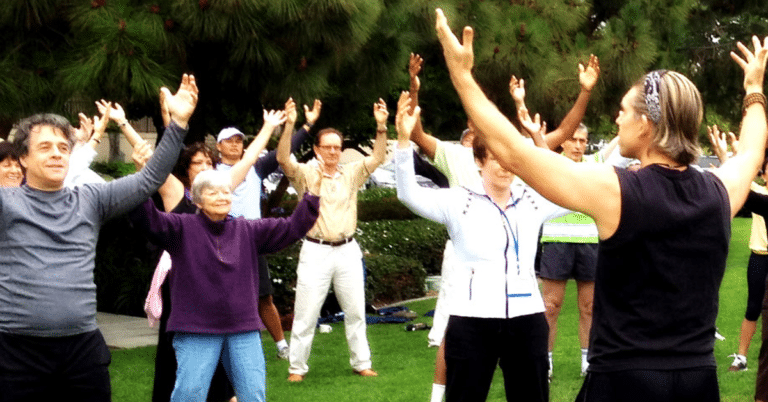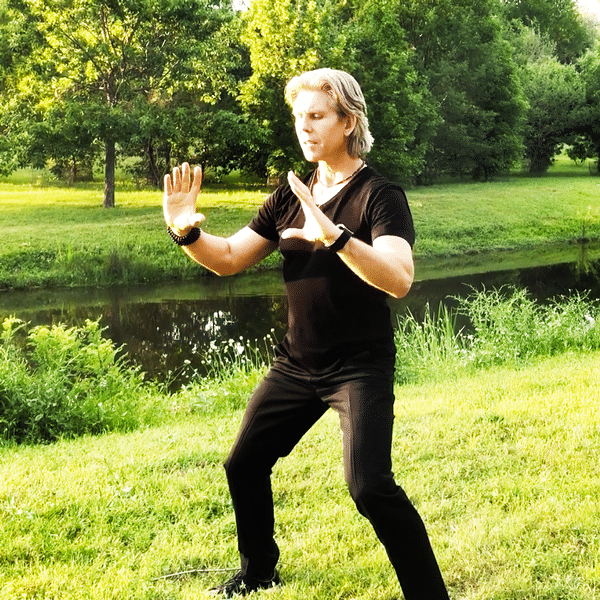

Have you ever heard of the ancient form of Chinese yoga called Qigong? Maybe you have wondered what the benefits of it are? Perhaps you actually aren’t at all familiar with what Qigong is?
If you haven’t heard of Qigong before, this article should help you understand everything you need to know about it. Including the many positives associated with meditation, movement and breathing to develop your ‘Life energy’ or Qi, pronounced Chi.
Qigong is a great practice that has many mental and physical benefits that comes with it. I am going to be talking about what Qigong is and where it came from, as well as the many benefits it provides.
Qigong is a mind-body-spirit practice that can help to improve your mental and physical health. It involves slow movements that help with posture, breathing techniques, self-massaged and focused intent.

The practice of Qigong involves repeated, gentle movements that stretch the body, build awareness and increase fluid movement.
Qigong has roots in Chinese medicine and many people often practice it with the belief that it can promote spirituality, health and martial arts.
Qigong originated over 5000 years ago and originally came from the East, however it is now frequently used in the modern world. There is a lot of supporting research available today which shows how effective Qigong is.
Many people practice Qigong for relaxation, self-healing, meditation, exercise and also to train for martial arts.
Some people also compare Qigong to a ‘moving meditation’.
There are many benefits of Qigong and it’s practice. All of these health benefits have a hugely positive impact on both your mental and physical health, leading to a happier and more fulfilled life.
Where it is not as physically tiring as other exercises such as running or weight lifting etc, Qigong is suitable and easily sustainable for all ages, becoming more of a way of life for its growing number of practitioners all around the world. We have listed 8 benefits of Qigong for information below.
As much of Qigong teaches better balance, it can also help people to move their joints without locking them and turn without straining any muscles. As ligaments can be overstretched quite easily, Qigong is a great practice to help you relax your muscles, especially if you fall.
It has been shown that people who practice Qigong can learn to avoid strain and improve circulation of fluids to help lessen the impact of injuries.
Qigong promotes better balance, so this can help with your joints and flexibility, this is what helps when preventing joint injury.

If someone has limited movement or is bedridden, this can sometimes weaken the muscles and organ systems after a certain period of time. However, Qigong has many techniques that the bedridden or weak can use.
A lot of Western exercises involve rapid or strenuous motion to strengthen the body, such as weight training or running. People who are bedridden or are seriously ill will unfortunately not be able to take part in this sort of exercise.
In Qigong, you can practice laying down, sitting or standing – everyone, no matter age or health, can use Qigong if they wish. In China, Qigong is prescribed to cancer patients, to build their strength up.
There has also been some research to support that Qigong can also promote healing in cancer patients.
As Qigong is an exercise that can help your body and mind, the two can work together through the practice to promote relaxation. When you start to relax throughout your practice, any stress that you have should reduce.
Many of the movements that are involved in Qigong can also help to directly target certain problem areas, such as depression, frustration or stress.
Qigong is a positive release to help reduce stress and balance your life energy. There is also a clearing process in Qigong that can help with any repressed emotions (including stress).
There have been studies to show that Qigong can help to build the immune system. A study that was conducted showed that Qigong helped to increase the 2 white blood cell types that mostly make up the lymphatic immune system.
The lymph system is energized when practicing Qigong, so this can also help to improve the immune system too.
When you practice Qigong and open your energy channels, it can help to enable your natural healing abilities to accelerate (this helps with recovery time).
When you practice Qigong, the techniques can help to strengthen the mind and body connection. The Qi (or Chi) can also flow along the nerves too.
Your body awareness should also grow with the ongoing practice of Qigong. This can then put yourself in touch with your own nervous system.

Ultimately, this process should then help your nerves to grow stronger as your chi gets stronger. This can be of great benefit to people who have poor mobility or coordination.
Where it can help to strengthen the nervous system, this can also help people who have suffered from long-term stress and need to rebuild their bodies.
For those who have had surgery or suffered an injury – Qigong can be a great practice to aid and speed up recovery.
As I have mentioned before, the exercises contribute to increased blood circulation in the body using gentle movements that all parts of the body can benefit from.
This can then help to speed up recovery as the circulation and energy flow will be sent to all parts of the body, including the injured parts.
This is a great benefit for people who are recovering from surgery or an injury.
Another benefit of Qigong exercises is that it can be a great practice for aiding your digestion. When you practice the movements that are involved, you will be massaging your digestive organs.
When the digestive organs are being massaged, it will increase the amount of oxygenated blood that is sent to them. Overall, this can then help and improve the function of the digestive system.
This can be particularly beneficial for anyone who has problems with this area as a natural remedy over medication.
Studies have shown that Qigong can help to lower blood pressure. A study that lasted 30 years showed that people who practiced regularly were able to get off or decrease their blood pressure drugs.
As exercise improves circulation, it increases the elasticity of the blood vessels also. As low and high blood pressures are both problems that involve vascular elasticity and strength – Qigong can help with both.
China prescribes Qigong practice for both blood pressure problems.
If you want to take advantage of the numerous health benefits and unlock your life energy by learning Qigong yoga, we recommend the Satori Method.
With a large following of advocates, the Satori Method is proven to help people awaken their energy, focus, and clarity through the positive power of Qigong. Find out more here and we wish you the best of luck on your personal development journey.
